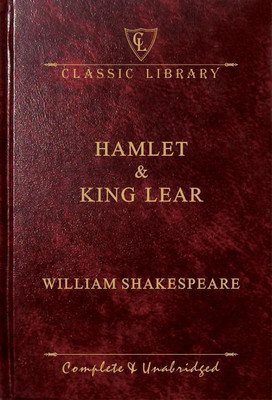HAMLET & KING LEAR (Wilco Classic Library) Hardcover ŌĆō 2003(English, Hardcover, William Shakespeare)
Quick Overview
Product Price Comparison
"I read three Shakespeares," President George W. Bush boasted of his vacation book list during an interview last week on the NBC Nightly News. Presumably, he meant plays, not sonnets. But even a meager 42 lines of the playwright is something for the U.S. leader to crow about. William Shakespeare remains that pre-eminent. In a time when just about every aesthetic standard is otherwise open to blogosphere debate, he universally ranks as the best writer in English ever. Director Terry Hands, recalling that his words are still spoken aloud on our stages, says, "In England, we call him our greatest living writer." As we face the fall season here, he's alive in Chicago. At the risk of bollixing one of his own statements, the time is very much in joint. "Hamlet" and "King Lear," two of his greatest works, are on the brink of side-by-side productions. "Hamlet" is now in previews at Chicago Shakespeare Theater, and "Lear" begins performances Saturday at the Goodman Theatre. The directors hail from opposite sides of the Atlantic. Great Britain's Hands, distinguished former artistic director of the Royal Shakespeare Company, is mounting "Hamlet." Chicago's Robert Falls, celebrating his 20th season as head of the Goodman, is adding "Lear" to credits including "Hamlet" at Wisdom Bridge and "Death of a Salesman" and "Long Day's Journey Into Night" here and on Broadway. Huge casts, celebrated directors, mammoth masterpieces, incandescent language and great expectations. The challenges -- and opportunities -- are titanic. Just to explore why these plays matter is to dive deeply into an ocean of centuries-old debate among scholars, critics, thespians, psychologists, teachers and students. More simply, and nearly impossible to answer: Why are "Hamlet" and "King Lear" so great? And which is the greatest? Both rank with that elite club of Western artworks that endure as monuments: the Eiffel Tower, the Sistine Chapel, the Mona Lisa and Beethoven's Ninth Symphony come to mind. Both are known to those who've never read them. Conveniently, they're an almost bottomless study in contrasts. Hamlet is a young king wrongly robbed of his throne. Lear is an old monarch who willingly gives his crown away. Hamlet is too self-aware, Lear not enough so. "Hamlet" is a maelstrom of mystery. Answer one question, only to stumble onto another. Why does he wait so long to take the revenge his ghost of a father demands? Does he love and desire Ophelia -- or his mother? If he can easily kill Polonius hiding in his mother's bedroom, why can't he kill Claudius?


